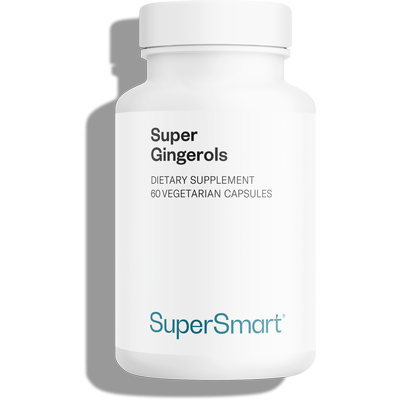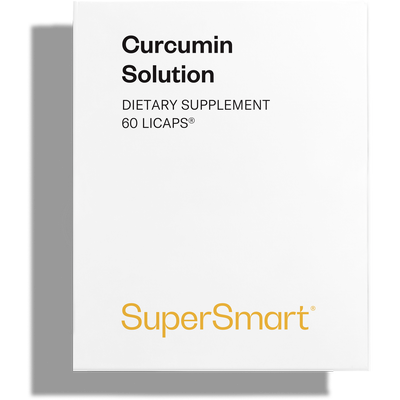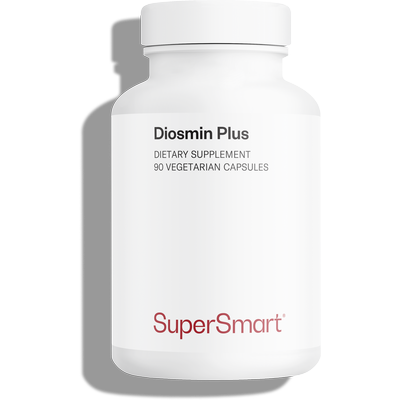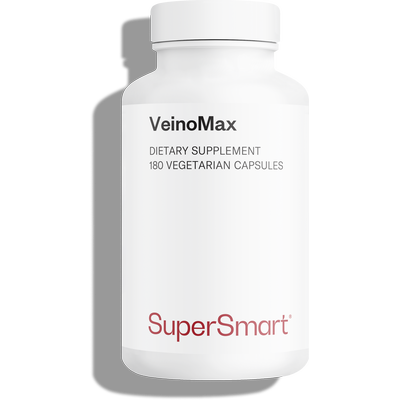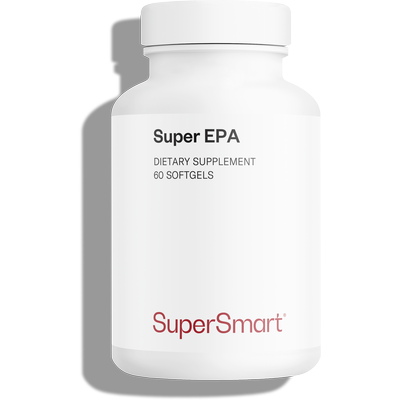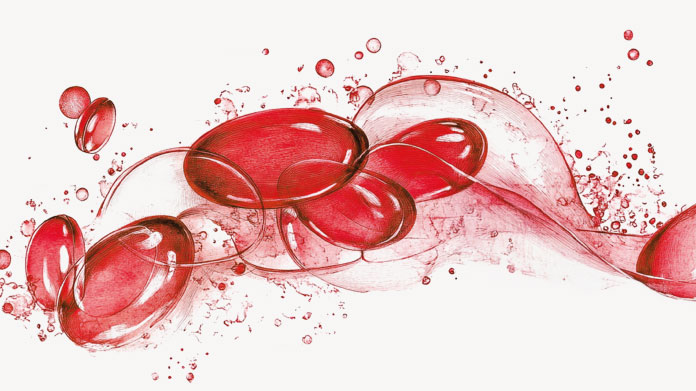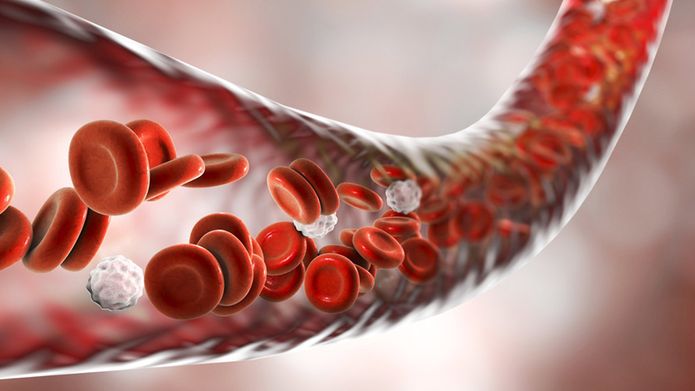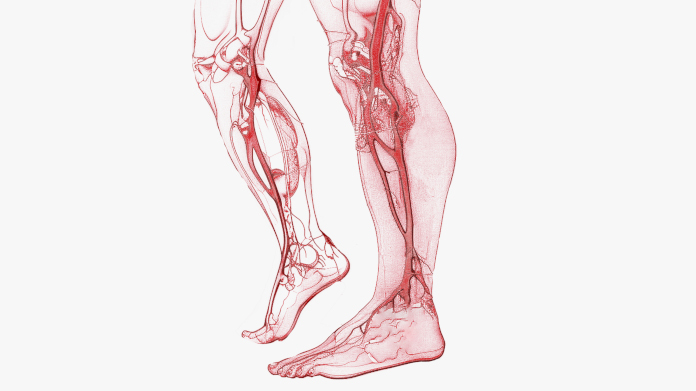How to thin the blood naturally?
Find out how to thin the blood and promote good circulation through diet, lifestyle and certain plant-based substances, without resorting to drugs.

What does ‘thinning the blood’ mean?
Thinning the blood means making the blood less thick or viscous, so that it flows more easily through the blood vessels.
But why is it useful to thin the blood?
Normally, blood coagulates to stop bleeding after an injury. But when this mechanism gets out of hand or works inappropriately, clots can form and disrupt blood circulation.
Thicker blood means slower blood flow, which encourages coagulation. The presence of a clot in a small or large blood vessel can lead to serious complications such as stroke, pulmonary embolism or myocardial infarction (1).
Smooth blood circulation therefore helps to prevent and limit the risk of cardiovascular disease, including high blood pressure, and the formation of blood clots.
While there are, of course, anticoagulant drugs (such as aspirin or anti-vitamin K), it is also possible to address excessive blood clotting by adopting a healthy lifestyle or using natural substances.
The aim here is not to treat a diagnosed pathology that requires medical treatment. Rather, this article is about supporting circulatory balance in general, to help the blood circulate more freely.
Good habits for thinning the blood without medication
Choose foods that promote good blood circulation
As is often the case in natural health, diet is one of the most useful levers for keeping blood flowing freely. Certain foods are recognised for their benefits to the cardiovascular system.
This is particularly true of fruit and vegetables, as well as certain spices and aromatic plants rich in antioxidants that help protect blood vessels from oxidative stress (2).
Foods that are sources of unsaturated fatty acids, such as oily fish or vegetable oils (rapeseed, linseed, olive), are also good for supporting lipid and circulatory balance (3).
Conversely, it is wise to limit excessive consumption of foods rich in saturated fats, simple carbohydrates, salt and alcohol. All of these can impair blood circulation and encourage metabolic imbalances (excess cholesterol, high blood sugar levels, etc.).
Finally, good daily hydration is essential to maintain good blood flow and optimum blood viscosity.
Physical activity to stimulate circulation
Regular exercise is one of the best ways of maintaining good blood flow (4).
Physical exercise promotes venous return and reduces blood stagnation in the lower limbs. This can be a major cause of heavy legs and blood clots.
Brisk walking, swimming or cycling are particularly recommended to gently get the heart pumping.
Conversely, a sedentary lifestyle increases the risk of poor circulation and blood stagnation.
Learn to manage stress to protect your cardiovascular system
Chronic stress can have a direct impact on circulatory health (5).
It promotes the excessive release of cortisol and adrenaline, two hormones that contribute to the hypercoagulability of blood, i.e. increase its clotting capacity.
By learning to manage your stress more effectively, you can indirectly improve the fluidity of your blood and the health of your heart and blood vessels.
Try meditation, deep-breathing techniques, yoga or any activity that relaxes you, as long as it does not present a health risk.
Natural substances that support blood flow
Garlic: a traditional ally of blood circulation
Garlic has been used for centuries for its many benefits.
In particular, it contains sulphur compounds such as allicin, which have been studied by the scientific community for their effects on blood pressure, blood circulation and platelet aggregation (the phenomenon behind blood clotting) (6).
Ginger: a tonic and stimulant
Ginger contains gingerols and shogaols, active ingredients that are attracting the interest of the scientific community for their potential action on blood fluidity.
Studies suggest that these substances may inhibit platelet aggregation, a key process in the formation of blood clots (7).
Natural oral ginger supplements are available to enrich your diet.
- Take Super Gingerols, a food supplement made from the rhizome of Zingiber officinale with 20% gingerols for optimum effectiveness.
Curcumin: the active ingredient in turmeric
Curcumin, turmeric's main polyphenol, is being studied for its potential antioxidant and anti-inflammatory effects.
Studies show that curcumin may encourage blood vessels to dilate, promoting blood circulation (8). It may also reduce platelet aggregation (9).
Studies have also shown that curcumin has interesting antioxidant properties for combating oxidative stress (10). Oxidative stress is responsible for the premature ageing of cells, including the walls of blood vessels.
To reap the benefits of turmeric, it can be taken as a dietary supplement.
- Discover the Curcumin Solution food supplement, which contains the most bioavailable form of curcumin on the market.
Omega-3 fatty acids: good for the cardiovascular system
Omega-3 fatty acids, particularly EPA (eicosapentaenoic acid), have been studied for their impact on the cardiovascular system.
EPA contributes to the normal functioning of the heart and the maintenance of normal blood pressure.
According to research, EPA competes with other substances in cell membranes. In this way, it promotes the production of molecules that limit platelet aggregation more strongly than those produced by the competitors it has replaced (11).
It is found in oily fish (salmon, sardines, mackerel, herring) and certain vegetable oils. It can also be consumed in the form of a natural supplement.
- Discover the Super EPA food supplement based on eicosapentaenoic acid, which also contains vitamin E.
Substances that can support venous circulation
Even if they do not act directly on blood fluidity, certain natural substances are recognised for their ability to support the proper functioning of venous circulation.
Numerous clinical trials have examined the effects of diosmin, a flavonoid extracted from citrus fruits, on blood circulation. Some studies suggest that it may strengthen vein walls and improve microcirculation (12).
- Discover the Diosmin Plus dietary supplement, standardised to 80% diosmin.
Horse chestnut also helps to maintain good blood circulation. It is therefore often included in veinotonic formulas.
- Discover the VeinoMax food supplement, which also contains flavonoids such as diosmin and plant extracts of bilberry, grape seed, hawthorn, etc.
Precautions to take for good blood circulation
Even if adopting a natural approach can help support blood circulation, it is essential to act with discernment.
If you are taking anticoagulant treatment or suffer from cardiovascular disease, certain foods or substances may present risks of drug interactions or alter blood balance. Pregnant or breastfeeding women must also be very careful.
It is therefore essential to seek the advice of your doctor or pharmacist before taking any dietary supplement likely to affect these parameters, whatever the dosage.
This article suggests a number of ways in which you can help yourself, but in no way replaces appropriate medical treatment.
SUPERSMART ADVICE
References
- Ashorobi D, Ameer MA, Fernandez R. Thrombosis. 2024 Feb 12. In: StatPearls [Internet]. Treasure Island (FL): StatPearls Publishing; 2025 Jan–. PMID: 30860701.
- Varadharaj S, Kelly OJ, Khayat RN, Kumar PS, Ahmed N, Zweier JL. Role of Dietary Antioxidants in the Preservation of Vascular Function and the Modulation of Health and Disease. Front Cardiovasc Med. 2017 Nov 1;4:64. doi: 10.3389/fcvm.2017.00064. PMID: 29164133; PMCID: PMC5671956.
- de Carvalho CCCR, Caramujo MJ. The Various Roles of Fatty Acids. Molecules. 2018 Oct 9;23(10):2583. doi: 10.3390/molecules23102583. PMID: 30304860; PMCID: PMC6222795.
- Green DJ, Smith KJ. Effects of Exercise on Vascular Function, Structure, and Health in Humans. Cold Spring Harb Perspect Med. 2018 Apr 2;8(4):a029819. doi: 10.1101/cshperspect.a029819. PMID: 28432115; PMCID: PMC5880156.
- Sara JDS, Toya T, Ahmad A, Clark MM, Gilliam WP, Lerman LO, Lerman A. Mental Stress and Its Effects on Vascular Health. Mayo Clin Proc. 2022 May;97(5):951-990. doi: 10.1016/j.mayocp.2022.02.004. PMID: 35512885; PMCID: PMC9058928.
- Rahman K, Lowe GM. Garlic and cardiovascular disease: a critical review. J Nutr. 2006 Mar;136(3 Suppl):736S-740S. doi: 10.1093/jn/136.3.736S. PMID: 16484553.
- Mohammadabadi T, Ben Ayad AE, Maheshwari A. Ginger: A Nutraceutical Supplement for Protection Against Various Cardiovascular Diseases in Clinical Trials. Cureus. 2025 Mar 19;17(3):e80841. doi: 10.7759/cureus.80841. PMID: 40255738; PMCID: PMC12007927.
- Cox FF, Misiou A, Vierkant A, Ale-Agha N, Grandoch M, Haendeler J, Altschmied J. Protective Effects of Curcumin in Cardiovascular Diseases-Impact on Oxidative Stress and Mitochondria. Cells. 2022 Jan 20;11(3):342. doi: 10.3390/cells11030342. PMID: 35159155; PMCID: PMC8833931.
- Hussain Y, Abdullah, Khan F, Alsharif KF, Alzahrani KJ, Saso L, Khan H. Regulatory Effects of Curcumin on Platelets: An Update and Future Directions. Biomedicines. 2022 Dec 8;10(12):3180. doi: 10.3390/biomedicines10123180. PMID: 36551934; PMCID: PMC9775400.
- Jakubczyk K, Drużga A, Katarzyna J, Skonieczna-Żydecka K. Antioxidant Potential of Curcumin-A Meta-Analysis of Randomized Clinical Trials. Antioxidants (Basel). 2020 Nov 6;9(11):1092. doi: 10.3390/antiox9111092. PMID: 33172016; PMCID: PMC7694612.
- Larson MK, Tormoen GW, Weaver LJ, Luepke KJ, Patel IA, Hjelmen CE, Ensz NM, McComas LS, McCarty OJ. Exogenous modification of platelet membranes with the omega-3 fatty acids EPA and DHA reduces platelet procoagulant activity and thrombus formation. Am J Physiol Cell Physiol. 2013 Feb 1;304(3):C273-9. doi: 10.1152/ajpcell.00174.2012. Epub 2012 Nov 21. PMID: 23174566; PMCID: PMC3566437.
- Huwait E, Mobashir M. Potential and Therapeutic Roles of Diosmin in Human Diseases. Biomedicines. 2022 May 6;10(5):1076. doi: 10.3390/biomedicines10051076. PMID: 35625813; PMCID: PMC9138579.
Keywords
2 Days
Super smart is really…super !
I would like to share my excellent experience with the company’s fast and efficient customer service. Even though I was calling from abroad, I was able to reach them relatively quickly. They responded to all my emails promptly and kept me consistently informed about the status of my order. When I needed assistance correcting a mistake I had made with my order, Ms. Lorie handled the issue immediately and very professionally. Thanks to their support and efficiency, I received my Super Smart products in Greece much faster than expected. Thank you very much for the outstanding service!
Kazanti Kleopatra
5 Days
Ordering and delivery is easy and fast
Ordering and delivery is easy and fast
Peter
7 Days
Simple and quick :-)
My order was delivered quickly, and I'm satisfied with the product! It was lot less fuss compared with some things I've ordered.
DEL Jacqueline
7 Days
Excellent quality products & customer…
Excellent quality products & customer service & care …thank you!
Giovanna Escalera
9 Days
great experience
Easy ordering, fast deliver, very professionally.
Natasa
12 Days
this company and its products are…
this company and its products are perfect: I have been their customer for three years , prices are reasonable for the high quality they offer , the products are of very good quality not just plainly "normal" , delivery is quite fast. we are very satisfied with them.
Gabriel Diacakis
12 Days
TOP service TOP products will buy again…
TOP service TOP products will buy again and again
PINOTTI Giorgio
15 Days
Trustworthy company with tested products
Trustworthy company with tested products
Trusted
19 Days
Efficiency and speed
Efficiency and speed
Cuccie
21 Days
GOOD BRAND IN FOOD COMPLEMENTS
GOOD BRAND IN FOOD COMPLEMENTS - SERIOUS WITH GOOD DOCUMENTS AND DETAILS SCIENTIST. AND SERIOUS HONNEST COMMERZIALISATION. I HAVE TRUST IN THEIR PRODUCTS.
FENOGLIO Guy
22 Days
Very good experience
Very good experience, the products arrived in time, in perfect condition and are good quality. Thank you.
GABI TIRCOCI
28 Days
very good expereince
very good expereince
Jelena Đaković
28 Days
Very good products.
Very good products.
Agnes BENDSAK
30 Days
Just OK
Just OK, ordering from company for many years and being safisfied
Lynn Mae
30 Days
Recomendo
Produtos encomendados são recebidos atempadamente e de acordo com o anunciado! Muito satisfeita!
Carla Sofia
of experience
your money back
##montant## purchase


